Anpassungsfähigkeit und Resilienz des Finanzsystems
Diese Forschungsgruppe untersucht kritische Aspekte der Anpassungsfähigkeit und Widerstandsfähigkeit von Finanzsystemen. Sie analysiert die Auswirkungen von Naturkatastrophen auf Finanzsysteme, die Auswirkungen politischer Präferenzen für die grüne Transformation und die Bedeutung von Kultur in den Volkswirtschaften.
Forschungscluster
Finanzresilienz und RegulierungIhr Kontakt

Mitglied - Abteilung Finanzmärkte
PROJEKTE
07.2016 ‐ 12.2018
Relationship Lenders and Unorthodox Monetary Policy: Investment, Employment, and Resource Reallocation Effects
Leibniz-Gemeinschaft
We combine a number of unique and proprietary data sources to measure the impact of relationship lenders and unconventional monetary policy during and after the European sovereign debt crisis on the real economy. Establishing systematic links between different research data centers (Forschungsdatenzentren, FDZ) and central banks with detailed micro-level information on both financial and real activity is the stand-alone proposition of our proposal. The main objective is to permit the identification of causal effects, or their absence, regarding which policies were conducive to mitigate financial shocks and stimulate real economic activities, such as employment, investment, or the closure of plants.
01.2015 ‐ 12.2019
Interactions between Bank-specific Risk and Macroeconomic Performance
Deutsche Forschungsgemeinschaft (DFG)
Referierte Publikationen
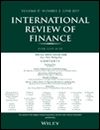
Cross-border Exposures and Financial Contagion
in: International Review of Finance, Nr. 2, 2010
Abstract
Integrated financial markets provide opportunities for expansion and improved risk sharing, but also pose threats of contagion risk through cross-border exposures. This paper examines cross-border contagion risk over the period 1999–2006. To that purpose we use aggregate cross-border exposures of 17 countries as reported in the Bank for International Settlements Consolidated Banking Statistics. We find that a shock that affects the liabilities of one country may undermine the stability of the entire financial system. Particularly, a shock wiping out 25% (35%) of US (UK) cross-border liabilities against non-US (non-UK) banks could lead to bank contagion eroding at least 94% (45%) of the recipient countries' banking assets. We also find that since 2006 a shock to Eastern Europe, Turkey and Russia affects most countries. Our simulations also reveal that the ‘speed of propagation of contagion’ has increased in recent years resulting in a higher number of directly exposed banking systems. Finally, we find that contagion is more widespread in geographical proximities.
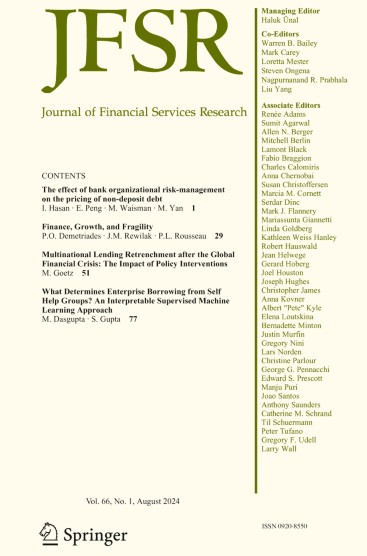
The Impact of Bank and Non-bank Financial Institutions on Local Economic Growth in China
in: Journal of Financial Services Research, Nr. 2, 2010
Abstract
This paper provides evidence on the relationship between finance and growth in a fast growing country, such as China. Employing data of 27 Chinese provinces over the period 1995–2003, we study whether the financial development of two different types of financial institutions — banks and non-banks — have a (significantly different) impact on local economic growth. Our findings indicate that banking development shows a statistically significant and economically more pronounced impact on local economic growth.

Lending Technology, Bank Organization and Competition
in: Journal of Financial Transformation, 2009
Abstract
This paper reviews recent theoretical and empirical studies investigating how both bank technology and organization shape bank-borrower interactions. We refer to two related concepts for bank technology. First, the technologies banks employ in loan granting decisions and second, the advances in information technology linked to the bank's lending technology. We also summarize and interpret the theoretical and empirical work on bank organization and its influence on lending technologies. We show that the choice of lending technology and bank organization depend heavily on the availability of information, the technological progress in the collection of information, as well as the banking market structure and the legal environment. We draw important policy conclusions from the literature. Competition authorities and supervisors have to remain alert to the consequences of the introduction of any new technology because: (1) advances in technology do not necessarily lead to more intense banking competition, and (2) the impact of technological and financial innovation on financial efficiency and stability depends on the incentives of the entire „loan production chain.‟

The Impact of Organizational Structure and Lending Technology on Banking Competition
in: Review of Finance, Nr. 2, 2009
Abstract
We investigate how bank organization shapes banking competition. We show that a bank's geographical lending reach and loan pricing strategy is determined by its own and its rivals’ organizational structure. We estimate the impact of organization on the geographical reach and loan pricing of a large bank. We find that the reach of the bank is smaller when rival banks are large and hierarchically organized, have superior communication technology, have a narrower span of organization, and are closer to a decision unit with lending authority. Rival banks’ size and the number of layers to a decision unit soften spatial pricing.

Dynamic Order Submission Strategies with Competition between a Dealer Market and a Crossing Network
in: Journal of Financial Economics, Nr. 3, 2009
Abstract
We analyze a dynamic microstructure model in which a dealer market (DM) and a crossing network (CN) interact for three informational settings. A key result is that coexistence of trading systems generates systematic patterns in order flow, which depend on the degree of transparency. Further, we study overall welfare, measured by the gains from trade of all agents, and compare it with the maximum overall welfare. The discrepancy between both measures is attributable to two inefficiencies. Due to these inefficiencies, introducing a CN next to a DM, as well as increasing the transparency level, not necessarily produces greater overall welfare.
Arbeitspapiere
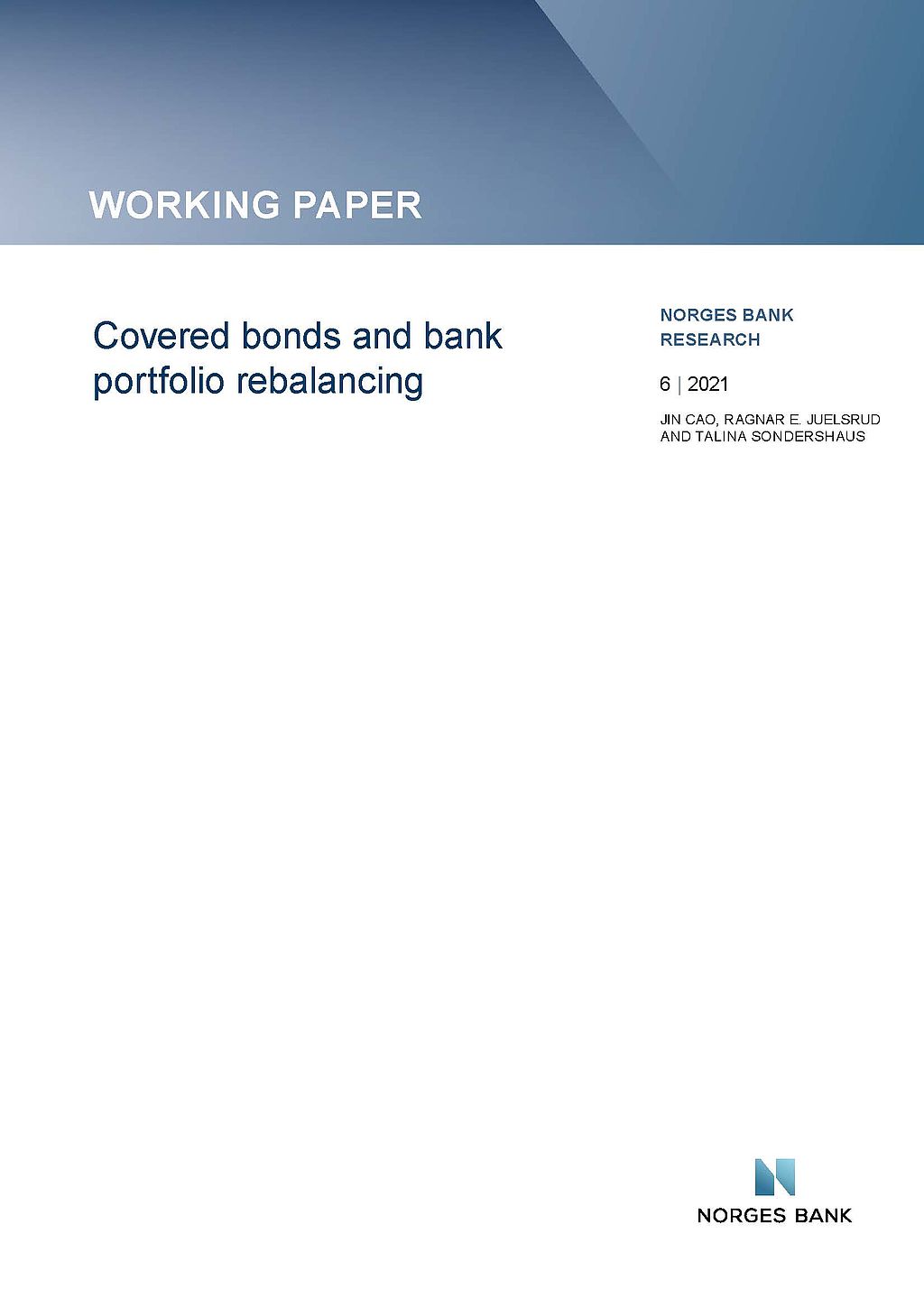
Covered Bonds and Bank Portfolio Rebalancing
in: Norges Bank Working Papers, Nr. 6, 2021
Abstract
We use administrative and supervisory data at the bank and loan level to investigate the impact of the introduction of covered bonds on the composition of bank balance sheets and bank risk. Covered bonds, despite being collateralized by mortgages, lead to a shift in bank lending from mortgages to corporate loans. Young and low-rated firms in particular receive more credit, suggesting that overall credit risk increases. At the same time, we find that total balance sheet liquidity increases. We identify the channel in a theoretical model and provide empirical evidence: Banks with low initial liquidity and banks with sufficiently high risk-adjusted return on firm lending drive the results.
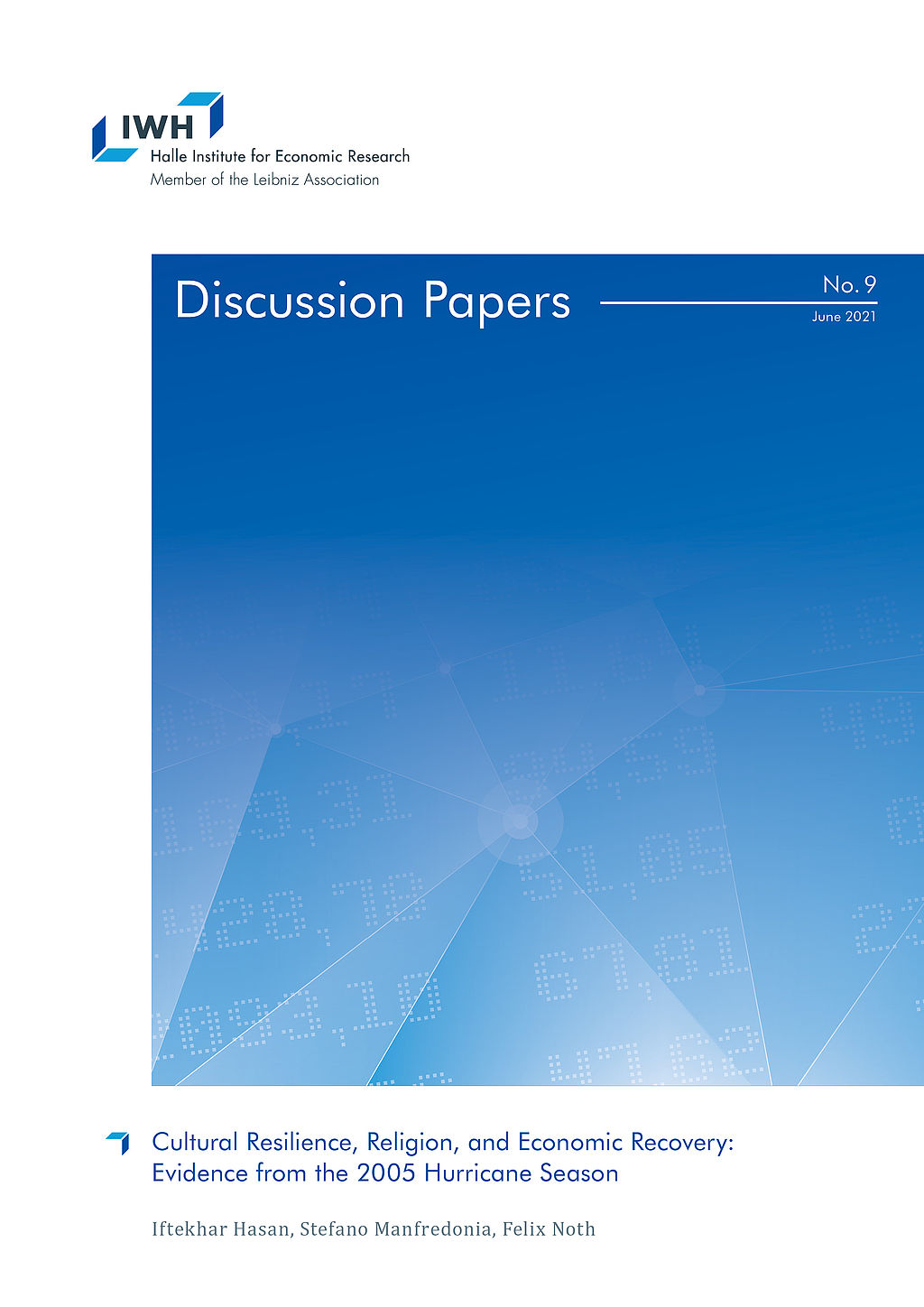
Cultural Resilience, Religion, and Economic Recovery: Evidence from the 2005 Hurricane Season
in: IWH Discussion Papers, Nr. 9, 2021
Abstract
This paper investigates the critical role of religion in the economic recovery after high-impact natural disasters. Exploiting the 2005 hurricane season in the southeast United States, we document that establishments in counties with higher religious adherence rates saw a significantly stronger recovery in terms of productivity for 2005-2010. Our results further suggest that a particular religious denomination does not drive the effect. We observe that different aspects of religion, such as adherence, shared experiences from ancestors, and institutionalised features, all drive the effect on recovery. Our results matter since they underline the importance of cultural characteristics like religion during and after economic crises.
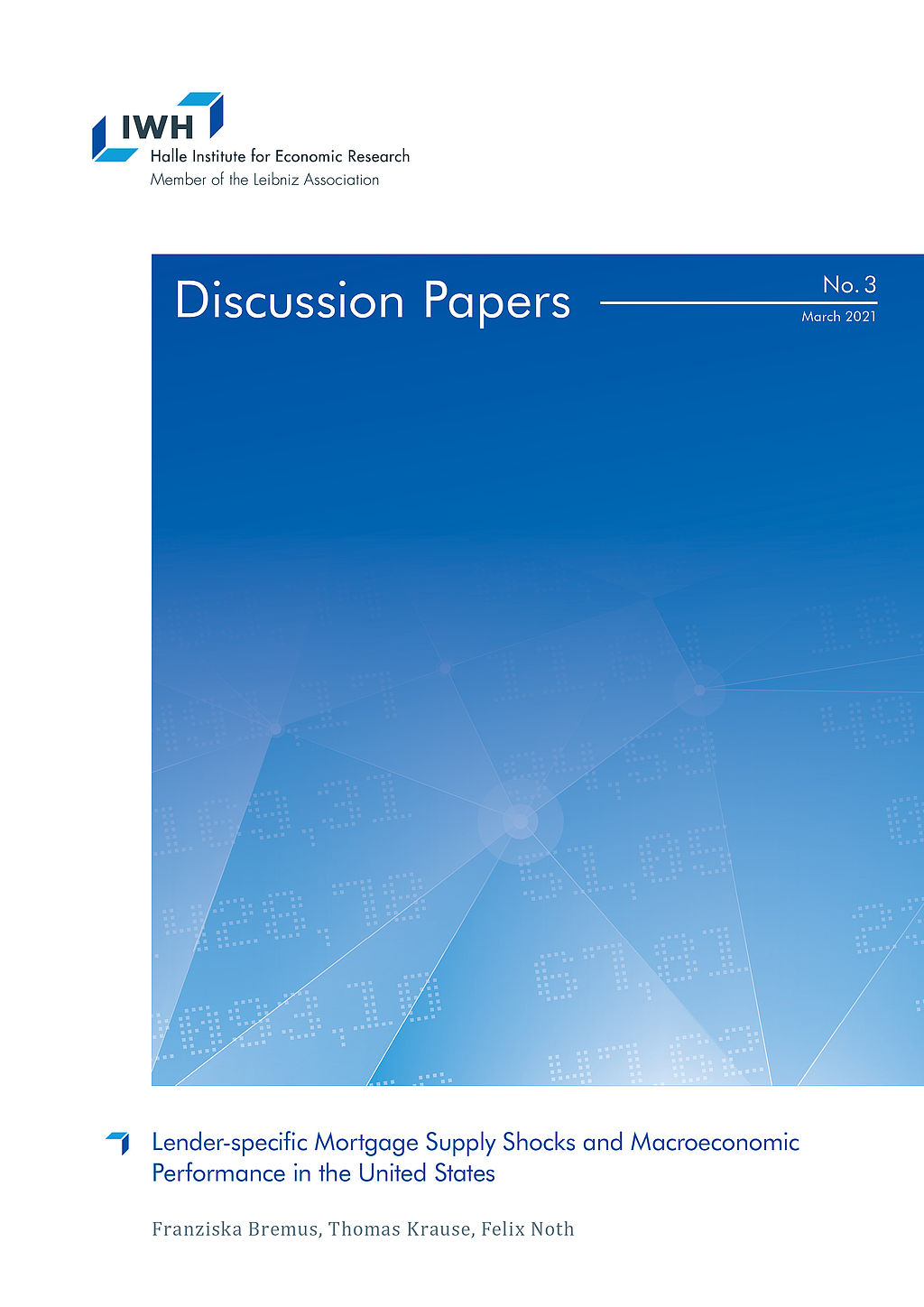
Lender-specific Mortgage Supply Shocks and Macroeconomic Performance in the United States
in: IWH Discussion Papers, Nr. 3, 2021
Abstract
This paper provides evidence for the propagation of idiosyncratic mortgage supply shocks to the macroeconomy. Based on micro-level data from the Home Mortgage Disclosure Act for the 1990-2016 period, our results suggest that lender-specific mortgage supply shocks affect aggregate mortgage, house price, and employment dynamics at the regional level. The larger the idiosyncratic shocks to newly issued mortgages, the stronger are mortgage, house price, and employment growth. While shocks at the level of shadow banks significantly affect mortgage and house price dynamics, too, they do not matter much for employment.
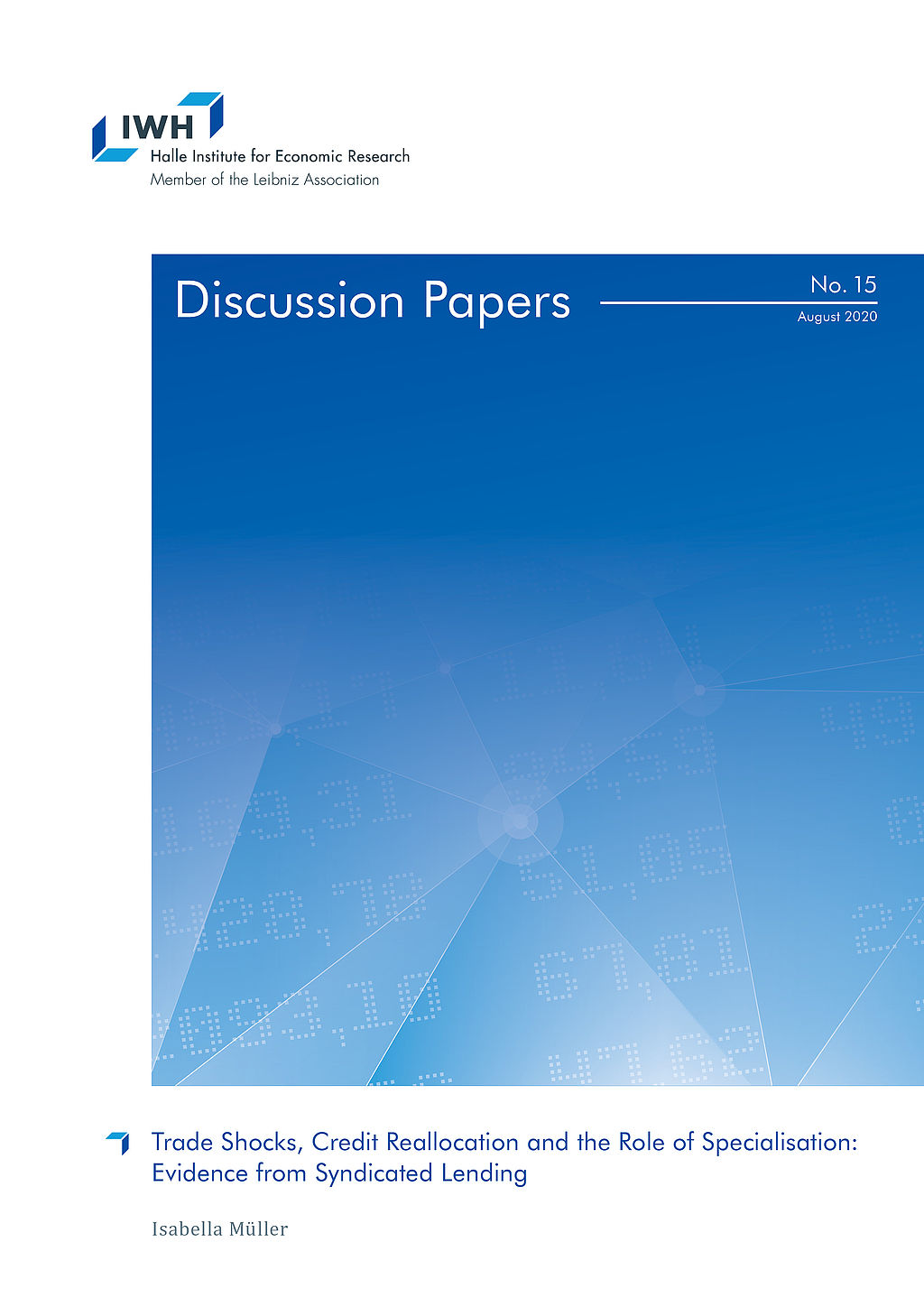
Trade Shocks, Credit Reallocation and the Role of Specialisation: Evidence from Syndicated Lending
in: IWH Discussion Papers, Nr. 15, 2020
Abstract
This paper provides evidence that banks cut lending to US borrowers as a consequence of a trade shock. This adverse reaction is stronger for banks with higher ex-ante lending to US industries hit by the trade shock. Importantly, I document large heterogeneity in banks‘ reaction depending on their sectoral specialisation. Banks shield industries in which they are specialised in and at the same time reduce the availability of credit to industries they are not specialised in. The latter is driven by low-capital banks and lending to firms that are themselves hit by the trade shock. Banks‘ adjustments have adverse real effects.
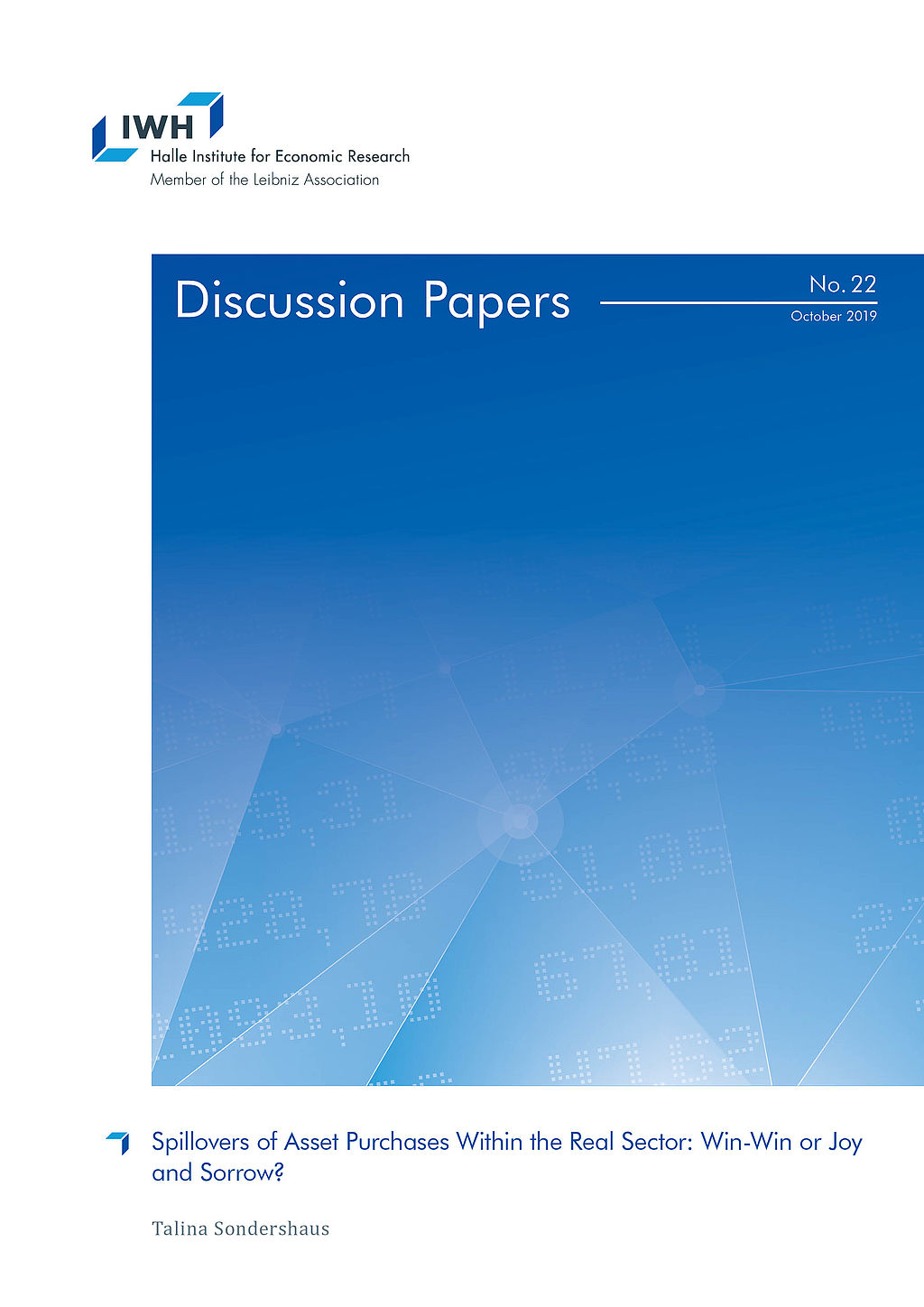
Spillovers of Asset Purchases Within the Real Sector: Win-Win or Joy and Sorrow?
in: IWH Discussion Papers, Nr. 22, 2019
Abstract
Events which have an adverse or positive effect on some firms can disseminate through the economy to firms which are not directly affected. By exploiting the first large sovereign bond purchase programme of the ECB, this paper investigates whether more lending to some firms spill over to firms in the surroundings of direct beneficiaries. Firms operating in the same industry and region invest less and reduce employment. The paper shows the importance to consider spillover effects when assessing unconventional monetary policies: Differences between treatment and control groups can be entirely attributed to negative effects on the control group.


















